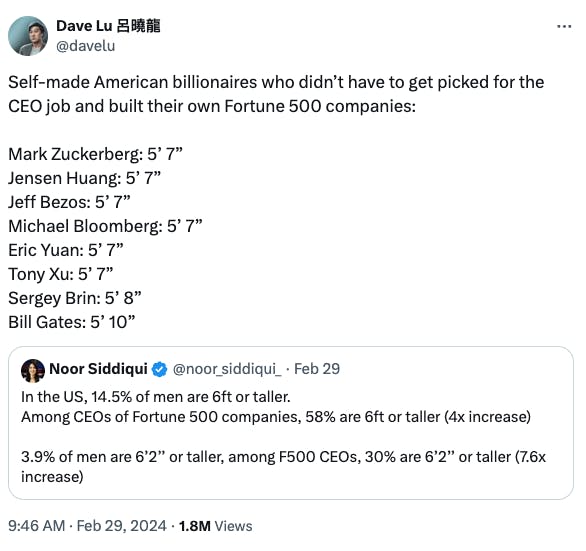Hot Dealmakers As Tech's Winter Lingers
Welcome, Weekenders! In this newsletter:
- A new VC star’s unordinary approach
- Our finest AI tips to improve your life
- How to best appreciate the new “Dune” movie
- Plus: What Socrates and Satya Nadella have in common; a vengeful billionaire and a murderous enigma; and a top-notch ‘Job.’
A couple days ago, something unusual caught my attention: an eye-catching software buyout! We used to have those all the time. Not so much anymore.
Still, even a few years ago, when investment bankers seemed to outnumber harbor seals in San Francisco, the $1.8 billion sale of OpenGov to Cox Enterprises would’ve struck me as intriguing. OpenGov has a noble, humble ambition—to sell software to local governments—fueled by venture dollars from firms like Founders Fund, Thrive Capital and Andreessen Horowitz, with Marc Andreessen sitting on its board alongside former Cisco CEO John Chambers. Joe Lonsdale, Palantir co-founder and venture capitalist, co-founded OpenGov and has served as its chair.
When I spoke to Lonsdale, he had a compelling answer about what made OpenGov worth the price: “It is important for our society for governments to work better and smarter and more efficiently—and get more done.” Those high stakes pass to Atlanta-based Cox, which, as you may recall, made another surprise acquisition in 2022 when it bought Axios for $525 million. Cox is owned by a group of quiet billionaires whose fortune goes back to progenitor James M. Cox, a media mogul and who ran as the Democratic candidate for president in 1920 with FDR as his running mate. The company has survived through the past century by dint of sensible management—and a pretty good track record with deals and acquisitions (aside from getting snookered by Elizabeth Holmes).
That solid reputation is partly what convinced OpenGov to sell itself to Cox. “OpenGov is like a precious gem to us,” Lonsdale said. “And in Cox’s hands, it’s something that will be treated that way.” (Read my full conversation with Lonsdale here.)
Since Cox buys little and often buys well, my eyes do widen when it actually picks up something. Come to think of it, I know another fellow who gets a similar reaction out of me…
(Abram Brown, the editor of The Information’s Weekend section, will be out scouting for wormsign this weekend. You can reach him at [email protected] or find him on X.)
The Big Read Investor Neil Mehta Answers the Panic Button
Investor Neil Mehta Answers the Panic ButtonThe first time Neil Mehta hit my radar, he had just, well, answered the panic button—a Bat Signal put up by billionaire Parker Conrad, who needed Mehta’s help securing financial support for his human resources unicorn, Rippling, during last year’s Silicon Valley Bank crisis. Conrad wanted a half-billion dollars. Mehta agreed. “The conversation took us maybe 10 minutes,” Mehta said when I spoke to him last year for a profile of Conrad. “Maybe 15 minutes.”
Mehta’s own profile continues to ascend, as my colleague Cory Weinberg details so wonderfully in this week’s Big Read. Cory illuminates Mehta’s unusual style of venture capital investing, which limits his portfolio to only a few companies, and his growing ambitions to broaden into other types of deals: distressed buyouts, equities—hell, even a movie theater.
The Top 5 Our Best Tips for Using AI in Everyday Life
Our Best Tips for Using AI in Everyday LifeAfter we published an anecdote-rich insiders’ guide to artificial intelligence last week, I took some of the advice it included and used ChatGPT as a sous-chef this week. Since I’ve been cooking a lot with a new Dutch oven this winter, I asked ChatGPT to give me a recipe for “a Turkish version of coq au vin.” It turned over a recipe for tavuk guvec (chicken with eggplant, bell peppers and other vegetables), and I asked it to make the dish as authentically Turkish as possible, which got it to add more spices (allspice, sumac) to the recipe. It suggested fresh mint, too, and did I panic when I couldn’t find any at Whole Foods? Nope! I asked ChatGPT what to do. It suggested some additional spices (dried oregano and thyme, fresh parsley) to deepen the dish’s flavors.
Another top use for AI is its ability to condense voluminous amounts of information. To that end, we’ve taken a page of the bot playbook and turned last week’s guide into a tightly edited list of the tips we liked the most. There’s much good advice there, and I encourage you to read it—even if you don’t want to spend the weekend as I plan to, hunting up the ingredients for salmon en papillote (salmon roasted in parchment paper with garlic, shallot and tarragon), a dish suggested by my digital sous-chef. We are still arguing about the wine pairing: As innovative as ChatGPT is, it does have trouble imagining fish with anything other than white wine (quelle horreur!).
 The Secret Strategies for Stronger Communication
The Secret Strategies for Stronger CommunicationA few years back, Charles Duhigg, bestselling author and Pulitzer-winning technology journalist, kept finding himself vexed by a task he thought he’d mastered long ago: communication. Sometimes that caused problems at his work as a New York Times boss—and sometimes it led to issues at home. “I got into this pattern with my wife where I’d come home from a long day, and I’d complain,” he recalled this week. “And she would offer me great advice, and instead of being able to hear what she was saying, I’d get more upset.”
He set out to figure out—once and for all—what makes good communication possible and put those answers in his new book, “Supercommunicators,” which has an enormous amount of stellar advice. And when I spoke to Duhigg about the book, he gamely agreed to whittle it down to a few essential tips for busy moguls.

Attending: A ‘Job’ Well Done
The off-Broadway play “Job” opens with a young woman, Jane, aiming a gun at her therapist, Loyd. You’ll spend the rest of the show learning the answer to the question “How’d she get here?” And since “Job” spends a taut, agonizing 80 minutes interrogating how the internet era has left the pair feeling isolated, alienated and depraved, you’ll also find yourself asking a much bigger, society-wide question: “God, how did we get here?”
Jane works at a big tech firm—well, she used to. She’s on leave after a viral public breakdown but desperately wants to return to work. Loyd will decide whether she’s fit to do so. (The two leads, Sydney Lemmon and Peter Friedman, originally met while appearing on “Succession.” She played a brief Kendall Roy fling; Friedman played Roy family henchman Frank.) They pair well together, sparring in a manner that puts the play’s razor-sharp dialogue to good use. Many scenes perfectly capture the fraught hilarity that often emerges in a millennial-boomer debate about technology, and as “Job” hurdles toward its twist ending, it achieves an increasingly uncomfortable reminder of how deeply the internet has wormed its way into all our psyches.—Julia Black
Listening: ‘Dune’ and the Denis-verse
When life on planet Earth stopped in early 2020, Jason Goldman, an early Twitter employee and a former Obama aide, joined pal Matt Herrero, another guy who’d gone from tech (Amazon) to politics (the Democratic National Committee), for a pandemic pastime: a weekly podcast about “Dune,” the sci-fi book series by Frank Herbert, and “Dune: Part One,” director Denis Villeneuve’s film adaptation, due out the following October. “We were like, ‘We’ll cover all the books, all of Denis Villeneuve’s movies, and we’ll cover the ‘Dune’ movie,” Goldman recalled this week. “But then the movie got moved a full year, and we needed to vamp.”
So “Dune Pod” morphed into “Escape Hatch,” an enjoyable romp through contemporary and classic nerd culture that Goldman and Herrero have broadened beyond the sands of Arrakis; they’ve spent recent episodes on the original “X-Men” film,” “Jurassic Park” and “Event Horizon.” They’re hardly alone in space, bringing in guests like “Spider-Man: Across the Spider-Verse” scribe Dave Callaham and “House of the Dragon” showrunner Ryan Condal. “We’ve found a community of folks who are really into science fiction and movies and just like hanging out together,” Goldman said. And for this week's "Dune: Part Two" release, he and Herrero celebrated in high style, renting out a San Francisco movie theater on Thursday evening for a private viewing with their friends.—A.B.
Watching: Money, Morals—and Madcap Midwestern Murder
If you haven’t booked a return ticket to “Fargo,” then hoo-ly moly. Do it immediately! I found the anthology series’ recently completed fifth season deeply rewarding. It has Jon Hamm as the antagonist, Juno Temple as the protagonist, Jennifer Jason Leigh as the vengeful billionaire and, most memorably, British character actor Sam Spruell as the murderous enigma, Ole Munch. Need I go on? Oh, gosh, I mostly want to plead the Fifth and make you do the rest of the detective work, but what I keep thinking about most is the season’s especially clever conclusion, which sheds some light on Ole Munch’s motivations over a meal of Bisquick biscuits and chili while bringing a seasonlong meditation on wealth, debt and ownership to a poetic end.—A.B.
Makes You Think
Short kings for the win.
